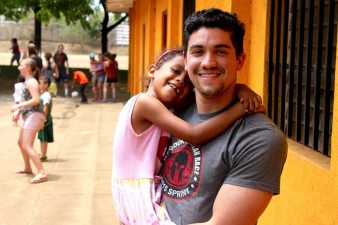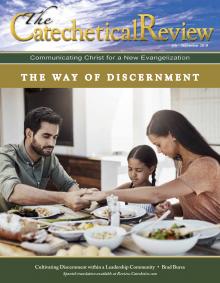 Following a long line of magisterial documents that address the importance of a communal environment conducive to fostering one's vocation,[1] the Preparatory Document of the upcoming XV Ordinary General Assembly of the Synod of Bishops, “Young People, the Faith and Vocational Discernment,”[2] states:
Following a long line of magisterial documents that address the importance of a communal environment conducive to fostering one's vocation,[1] the Preparatory Document of the upcoming XV Ordinary General Assembly of the Synod of Bishops, “Young People, the Faith and Vocational Discernment,”[2] states:
The entire Christian community should feel the responsibility of educating new generations. In fact, many Christians involved in this work deserve recognition, beginning with those who have assumed this responsibility within ecclesial life...Everywhere in the world, parishes, religious congregations, associations, movements and ecclesial realities exist which can devise and offer young people significant experiences of growth and discernment.[3]
In my years of doing ministry, in all of the talks I have heard on vocational discernment, and even given on occasion, quite often the focus lies on cultivating one’s spiritual life through personal prayer and the sacramental life of the Church. Notwithstanding the importance of the spiritual life,[4] and taking nothing away from the need for accompaniment in discernment, a central theme in the Preparatory Document,[5] I would like to focus on an oft-forgotten reality within vocational discernment: community. Because the upcoming Synod will focus on youth, I will direct my thoughts to communities of adults who minister to or teach youth (e.g. youth ministry core teams, catechists, school teachers, etc.). Rather than provide countless reasons why a discerning community is essential for vocational discernment, I would like to provide some considerations for cultivating this type of community. The Preparatory Document highlights this need, as it says:
Sometimes, the aspect of planning [experiences of growth and discernment for youth] shows signs of unpreparedness and a lack of skill, a situation which needs to be avoided by more earnestly undertaking the task of thinking, realizing, coordinating and implementing the pastoral programme for young people in a correct, consistent and effective manner. Such a task will also require a specific and continual preparation of those responsible for formation.[6]
While I will not claim to be an expert on this topic, nor can I provide a comprehensive “pastoral plan,” I did pick up on the importance of cultivating a community conducive to vocational discernment during my time as a parish youth minister surrounded by a team of adult volunteers. Drawing heavily from my own personal experience in youth ministry, perhaps some insights can serve as a catalyst for cultivating a community environment conducive to vocational discernment. Although my examples come from parish youth ministry and a community of volunteers serving on a core team, many of these thoughts could be extended to other parish/school organizations, structures, and even to families as well.
Fostering a Culture of Prayer and Accountability
One need not read too far into Jean-Baptiste Chautard’s classic The Soul of the Apostolate to get the main point: the active apostolate will not result in much if it is not fueled by the interior life.[7] Taking Chautard’s cue, each member of my volunteer team would consider his/her responsibilities and would discern a prudent and reasonable amount of time that would be spent in uninterrupted and undistracted personal prayer.[8] Knowing the difficulty of maintaining prayer commitments, I set up each core team member with an accountability partner (men with men, women with women). The partners were tasked with speaking once per week, on the phone or in person, in order to pray together and to report on their prayer commitments for the past week. It didn’t take long for partners to start texting each other with reminders and reports on a daily basis, as accountability started to bolster the personal prayer life of each member of the team.
Learning Principles of Discernment
The further one enters into the interior life, the more aware he/she is of various movements at the level of the heart. St. Ignatius of Loyola had the same experience following his deathbed-conversion and the long days of recovery spent daydreaming. He noticed that his soul was left with lasting peace when he considered pursuing the penitential life of the saint, like that of Dominic or Francis. Conversely, when he considered pursuing the service of a certain woman, he found that he was initially filled with excitement but that it quickly vanished leaving him discontent.[9] This exercise was the impetus of Ignatius’ discernment of spirits. As a core team, we frequented and discussed Ignatius’ rules for discernment of spirits and his rules for thinking within the Church,[10] and worked to personally apply the rules to our own interior lives. This personal practice greatly aided our communal practices of discernment.
Beginning Meetings in the Word
It is easy to mindlessly move past the “obligatory” opening prayer and dive into the “guts” of any business meeting. But what happens to a community when it intentionally slows down, proclaims, listens to, abides in, and shares personal reflection on the Word of God in Scripture? We made lectio divina the common way in which we prayed our way into meetings and into decisions that needed to be made for the good of the youth of the parish. In lectio, the Word speaks personally; but, as Benedict XVI notes, one must be attentive to an individualistic approach. “While it is a word addressed to each of us personally, it is also a word which builds community, which builds the Church.”[11] Spending time working our way through the five steps of lectio[12] and not being afraid to share with one another the insights and movements that the Word stirred within, not only helped us to grow in attentiveness to the Word, but in attentiveness to, and trust in, each other. A community of leaders that learns how to hear the Word of the Lord in Scripture will learn to hear the Word in ministry.
Testifying Before Providing Input
As a melancholic prone to melancholic fits, I often found myself discouraged as I would leave the parish late each Sunday night. No matter how many “successes” I could point to following a youth night, nothing could shake me from my gloom, save for time and the fact that youth ministry is so fast-paced that you simply have to move on. After meandering through this weekly dejection for several years, the Lord answered my prayer one Sunday night as I begged for help: I was asking my team the wrong question. At the end of each youth night we would gather to debrief and to pray. Usually I would open the debriefing with: “How do you think that went?” And, usually, one or two positive comments would be followed by a negative one about the timing of the schedule, a sloppily run aspect of the meeting, or a dismal small group session. And this one negative comment would be followed by several (or many) others until our time ran out and we prayed a “Hail Mary” and left...depressed. I was asking the wrong question. Does how we thought the night went matter much? If this is the Lord’s work, then what matters most is what he did and how he spoke. So, I started asking a new question: “What was God doing tonight?” This changed everything. Now my team started to pay more and more attention during each night to the activity of the Holy Spirit and to those finer details of ministry that are often missed. Meetings ended not with time for input (though sometimes this was necessary for logistical or pastoral purposes), but they ended with testimony. Eventually we took another step and turned the testimony into a prayer of thanksgiving together: “What should we thank God for tonight?” Seeking to give testimony over and above input radically changed our debriefing meetings, and it also changed our monthly planning meetings. The more attentive we are to the activity of the Holy Spirit as a leadership community in our communal discernment and testimony, the more attentive we are to the Lord’s will for next steps in ministry. I do not think it is coincidental that about a year after asking this new question, we sensed a call to shift youth ministry to a discipleship model—a decision that had massive ramifications for ministry and for the parish on the whole.
Affirming Giftedness as Foundational for Vocational Discernment
I’m told that after each retreat NET Ministries runs, the team gathers for prayer and also for affirmation. A team member is expected to pay close attention during the day to how other members are exercising gifts of the Spirit and are serving wholeheartedly, before genuinely and publicly affirming each other. Taking a page out of NET Ministries’ book, we started to look for genuine opportunities to affirm one another—a practice that “rubbed off” in our interactions with the youth. If we could be attentive to and point out the good God was doing through one another, we could be attentive to and point out the same in the teens. Affirmation can help us to see gifts that we did not know we had and can give us the ability to stand firm in the truth of who we are. This standing firm in who we are comes only as a gift from another’s affirmation, from the other saying “It is good that you exist.”[13] Coming to understand our own goodness, the truth of our being sons and daughters in the Lord, is a foundational step in discerning any vocation because it is the foundation of the universal vocation: the call to holiness.  Cultivating community within ministry must flow from the personal prayer and discernment of the person tasked with leading. Naturally, each program will take a different shape based upon the individual leadership and the personal needs of the group. Although this article identified several foundational principles that could aid this process, there is no one-size-fits-all prototype. When leadership takes discerning God’s will and its concrete implications seriously, it naturally fosters an environment wherein youth can more readily hear God’s voice and have the courage to respond boldly and generously. Brad Bursa is the Director of the Office for Youth Evangelization and Discipleship for the Archdiocese of Cincinnati.
Cultivating community within ministry must flow from the personal prayer and discernment of the person tasked with leading. Naturally, each program will take a different shape based upon the individual leadership and the personal needs of the group. Although this article identified several foundational principles that could aid this process, there is no one-size-fits-all prototype. When leadership takes discerning God’s will and its concrete implications seriously, it naturally fosters an environment wherein youth can more readily hear God’s voice and have the courage to respond boldly and generously. Brad Bursa is the Director of the Office for Youth Evangelization and Discipleship for the Archdiocese of Cincinnati.
Notes
This article originally appeared on pages 6-8 of the printed edition. Photo credits: First photo © Franciscan University of Steubenville; second photo © NET Ministries
This article is from The Catechetical Review (Online Edition ISSN 2379-6324) and may be copied for catechetical purposes only. It may not be reprinted in another published work without the permission of The Catechetical Review by contacting [email protected]

















